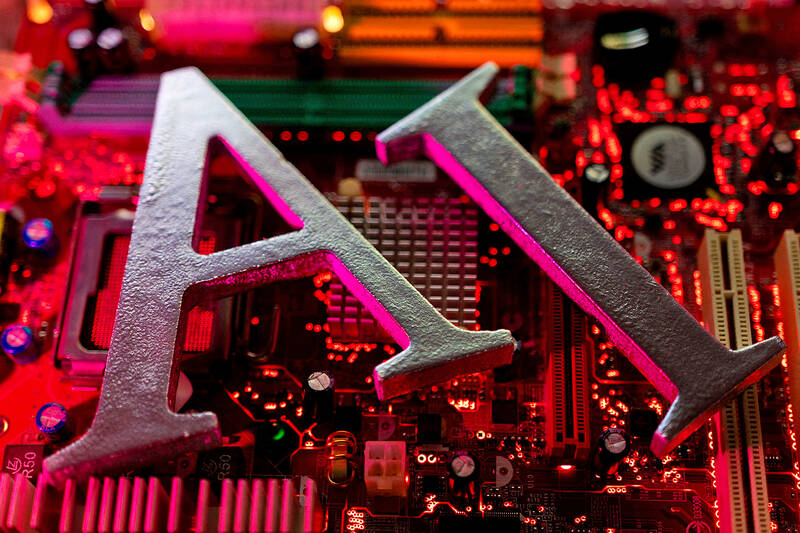Artificial intelligence (AI) executives at Intel Corp and Naver Corp yesterday touted the importance of forging a united front to counter Nvidia Corp’s dominance in the AI chip market.
Santa Clara, California-based Intel and South Korea’s biggest Internet company are teaming up to expand the open-platform software ecosystem based on Intel’s AI accelerator Gaudi. The two are part of a growing list of firms trying to loosen Nvidia’s dominance on the sector as it gets harder to secure graphics processing unit (GPU) accelerators to train generative AI devices.
“The monopoly situation needs to change in order to grow the market’s own pie and address the AI gap that the GPU supply chain is creating,” Ha Jung-woo, head of Naver’s Future AI Center, said during Intel’s AI conference in Seoul.

Photo: Reuters
Ha is one of the people behind the development of Naver’s HyperClova X large-language models.
Intel and Naver recently agreed to set up an AI chip research lab open to some of the country’s top South Korean universities and start-ups.
“The collaboration with Naver is very important and very strategic because we share a similar vision about the importance of having a robust ecosystem in AI,” said Justin Hotard, Intel’s executive vice president, and general manager of data centers and AI.
Separately, Intel agreed to sell a stake in a venture that controls a plant in Ireland to Apollo Global Management Inc for US$11 billion, helping bring in more external funding for a massive expansion of its factory network.
Under terms of the deal, the investment firm would take a 49 percent share of a joint venture that operates Intel’s Fab 34, the chipmaker said in a statement on Tuesday.
“The announcement highlights Intel’s continued progress in its transformation strategy,” the statement said. “The company continues to advance to create financial flexibility and accelerate its strategy, including investing in global manufacturing operations, while maintaining a strong balance sheet.”
It is the second such investment program that Intel has announced, part of an effort to lessen the burden on its already-stretched finances.
Intel said that construction of the plant, on an existing company site in Leixlip near Dublin, is “largely complete.”
The transaction, which allows Intel to invest elsewhere, would be completed in the second quarter of this year.
Fab 34 is to use Intel’s 4 and 3 manufacturing technologies.
In 2022, Intel announced a deal with Brookfield Infrastructure Partners LP to secure a US$15 billion commitment to help finance a semiconductor complex in Arizona.

PROTECTION: The investigation, which takes aim at exporters such as Canada, Germany and Brazil, came days after Trump unveiled tariff hikes on steel and aluminum products US President Donald Trump on Saturday ordered a probe into potential tariffs on lumber imports — a move threatening to stoke trade tensions — while also pushing for a domestic supply boost. Trump signed an executive order instructing US Secretary of Commerce Howard Lutnick to begin an investigation “to determine the effects on the national security of imports of timber, lumber and their derivative products.” The study might result in new tariffs being imposed, which would pile on top of existing levies. The investigation takes aim at exporters like Canada, Germany and Brazil, with White House officials earlier accusing these economies of

Teleperformance SE, the largest call-center operator in the world, is rolling out an artificial intelligence (AI) system that softens English-speaking Indian workers’ accents in real time in a move the company claims would make them more understandable. The technology, called accent translation, coupled with background noise cancelation, is being deployed in call centers in India, where workers provide customer support to some of Teleperformance’s international clients. The company provides outsourced customer support and content moderation to global companies including Apple Inc, ByteDance Ltd’s (字節跳動) TikTok and Samsung Electronics Co Ltd. “When you have an Indian agent on the line, sometimes it’s hard

‘SACRED MOUNTAIN’: The chipmaker can form joint ventures abroad, except in China, but like other firms, it needs government approval for large investments Taiwan Semiconductor Manufacturing Co (TSMC, 台積電) needs government permission for any overseas joint ventures (JVs), but there are no restrictions on making the most advanced chips overseas other than for China, Minister of Economic Affairs J.W. Kuo (郭智輝) said yesterday. US media have said that TSMC, the world’s largest contract chipmaker and a major supplier to companies such as Apple Inc and Nvidia Corp, has been in talks for a stake in Intel Corp. Neither company has confirmed the talks, but US President Donald Trump has accused Taiwan of taking away the US’ semiconductor business and said he wants the industry back

PROBE CONTINUES: Those accused falsely represented that the chips would not be transferred to a person other than the authorized end users, court papers said Singapore charged three men with fraud in a case local media have linked to the movement of Nvidia’s advanced chips from the city-state to Chinese artificial intelligence (AI) firm DeepSeek (深度求索). The US is investigating if DeepSeek, the Chinese company whose AI model’s performance rocked the tech world in January, has been using US chips that are not allowed to be shipped to China, Reuters reported earlier. The Singapore case is part of a broader police investigation of 22 individuals and companies suspected of false representation, amid concerns that organized AI chip smuggling to China has been tracked out of nations such